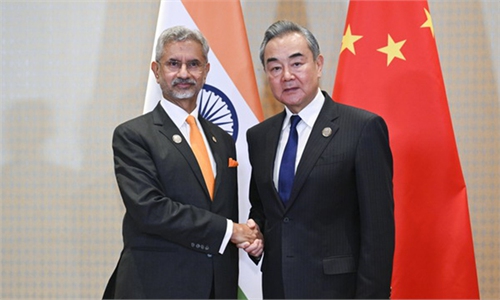India should allow consensus, rather than differences, to shape relations with China

Illustration: Chen Xia/Global Times
After Chinese Foreign Minister Wang Yi, who is also a member of the Political Bureau of the Communist Party of China Central Committee, met with Indian External Affairs Minister Subrahmanyam Jaishankar in Rio de Janeiro, Brazil, on Monday, the Indian media generally gave positive feedback. The Financial Express, for instance, hailed the meeting, marking the first official talks since the disengagement of military forces in two key friction points along the two countries' border, as "a significant diplomatic development."The recent surge in high-level talks between China and India has provided direction and momentum for the improvement of bilateral relations. Not long ago, China and India reached resolutions on relevant issues concerning the border. On October 23, Chinese President Xi Jinping met with Indian Prime Minister Narendra Modi on the margins of the BRICS Summit held in Kazan, Russia, during which they reached an important consensus on improving and developing bilateral ties. This shows the two sides are seeking a more stable relationship.
Jaishankar said during the meeting that the consensus between India and China far outweighs the differences, and that both sides should view bilateral relations from a strategic perspective, properly handle relevant issues with a more positive attitude, and not let specific disagreement dominate bilateral ties. These remarks highlighted again the fact that despite differences, China and India should keep a good relationship, which is in the interests of both countries. As geographical neighbors and the two most populous countries in the world, China and India not only face similar challenges, but also share extensive common interests.
India has its own reasons for seeking to improve relations with China. For India, a safe and stable internal and external environment is the basic guarantee for Modi's "New India" vision that prioritizes national development, and this is also the first consideration when India makes its domestic and foreign policies, according to Qian Feng, director of Research Department and senior research fellow at the National Strategy Institute at Tsinghua University. Amid rising international and regional uncertainties, how India defines its relations with China matters to India's core interests and developmental trajectory.
As the world's second-largest economy, China's growing international and regional influence has become a significant variable impacting India's external environment, and its role in helping promote India's economic and long-term development is evident. Consequently, even though the intentions of the US and some Western nations to court India while containing China have become increasingly apparent, India has adopted a cautious stance.
Beyond bilateral advantages, a healthy China-India relationship holds significant global implications. As Jaishankar noted on Monday, both countries play important roles in international affairs, which reflects the potential of their cooperation. Currently, China and India are bolstering their coordination and cooperation within multilateral frameworks such as the G20 and BRICS. If both nations can effectively manage their differences, they will contribute to the establishment of a more balanced world order that counters Western hegemony, thereby promoting stability in the development of the Global South and the world as a whole.
For China-India relations to become more stable, it is essential for both governments to maintain dialogue, strengthen economic ties, and promote cultural and personnel exchanges. During his meeting with Jaishankar, Foreign Minister Wang Yi called on the two countries to make practical progress in such issues as resuming direct flights, exchanging journalists and easing visa procedures as soon as possible. These are the concrete steps in the next stage to implement the important consensus reached by the leaders of the two countries when they met on the sidelines of the 16th BRICS Summit in Kazan, Russia in October.
Overall, there are encouraging signs that China-India relations are moving forward. India has made positive statements and the relations between the two countries are making progress. However, it's important to note that the strength of the momentum for improvement in bilateral relations in the future will largely depend on the sincerity of the Indian side. It is hoped that India can allow consensus, rather than differences, to shape China-India relations.

